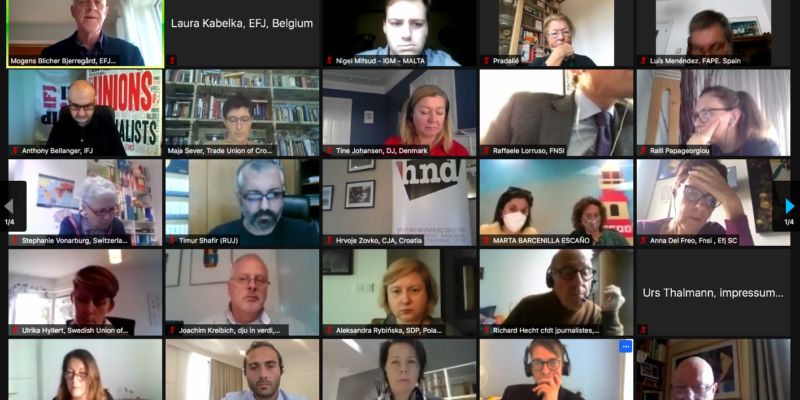EFJ held its Annual Meeting online due to Covid-19 pandemic

The European Federation of Journalists (EFJ) finally held its first ever digital Annual Meeting on 3 November 2020. The decision to organise it online was taken after the EFJ was forced – due to the Covid-19 pandemic – to cancel its event, which should have taken place last May in Zagreb, Croatia. The 2020 online edition was attended by over 70 affiliates from 43 countries.
Over 70 participants from 43 countries are ready to discuss @EFJEUROPE activity and financial report and some urgent matters in #COVID19 times! #efjam2020 #mediafreedom #journalismmatters #SocialRights #solidarity pic.twitter.com/fAE9sH7fnG
— EFJ (@EFJEUROPE) November 3, 2020
Not surprisingly, much of the discussion revolved around the consequences of the Covid-19 crisis on journalists and press freedom.
“Some authoritarian leaders, under the auspices of Covid-19, have increased the pressure on press freedom and have also shown less respect for the right to information,” said EFJ President Mogens Blicher Bjerregård in his opening speech.
“We will need a long and deep breath to get through these very difficult times. We are resilient and successful when we are in solidarity.”
In particular, he expressed solidarity with the colleagues in Belarus who have been facing repeated violations to their rights since the presidential elections on 9 August: “I can assure you that you can count on us. We will continue our cooperation with you until you achieve freedom.”
The Annual Meeting adopted the following six resolutions (published here) with a clear majority: on supporting a global news recovery; the EU recovery plan for the media sector; emergency measures for employment support; on Turkey and media freedom; on authors’ rights, neighbouring rights and negotiations; as well as on equal rights for all journalists.
In addition, the fate of many freelancers who can no longer make a living out of journalism, the trade union responses to the Corona measures, the need for an anti-SLAPP legislation, as well as the situation in Belarus and Turkey were considered as a matter of priority.
The Annual Meeting also denounced the situation in France where a draft law on “global security” make it punishable by one year of imprisonment and a fine of 45 000 euros to film or take photos of serving police officers or gendarmes. It goes against all provisions on press freedom in Europe and threatens to prevent journalists from simply doing their job.
‘Please be loud and help us in Europe’ urges @baj_by @OSCE_RFoM @JosepBorrellF @EEDemocracy @CoE_HRightsRLaw @Dunja_Mijatovic @CPJ_Eurasia @NATO https://t.co/RE1C9ubcfz
— Renate Schroeder (@renatemargot) November 3, 2020
As required, the assembly adopted the EFJ Activity Report for the past year and half, as well as the financial reports and the 2020 budget.
The Expert Groups (Freelance, Broadcasting, Labour Rights, Authors’ Rights and Digital) provided the chairs’ reports and agreed to build synergies across the groups to work together more closely on common issues such as collective bargaining and teleworking.
The discussions can be followed on Twitter with #EFJAM2020.






